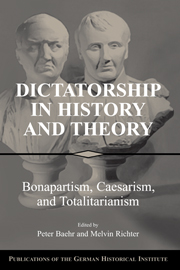Book contents
- Frontmatter
- Introduction
- PART I BONAPARTISM TO ITS CONTEMPORARIES
- 1 From Consulate to Empire: Impetus and Resistance
- 2 The Bonapartes and Germany
- 3 Prussian Conservatives and the Problem Of Bonapartism
- 4 Tocqueville and French Nineteenth-Century Conceptualizations of the Two Bonapartes and Their Empires
- 5 Marx’s Eighteenth Brumaire of Louis Bonaparte: Democracy, Dictatorship, and the Politics of Class Struggle
- 6 Bonapartism as the Progenitor of Democracy: The Paradoxical Case of the French Second Empire
- PART II BONAPARTISM, CAESARISM, TOTALITARIANISM: TWENTIETH-CENTURY EXPERIENCES AND REFLECTIONS
- PART III ANCIENT RESONANCES
- Index
1 - From Consulate to Empire: Impetus and Resistance
Published online by Cambridge University Press: 05 January 2013
- Frontmatter
- Introduction
- PART I BONAPARTISM TO ITS CONTEMPORARIES
- 1 From Consulate to Empire: Impetus and Resistance
- 2 The Bonapartes and Germany
- 3 Prussian Conservatives and the Problem Of Bonapartism
- 4 Tocqueville and French Nineteenth-Century Conceptualizations of the Two Bonapartes and Their Empires
- 5 Marx’s Eighteenth Brumaire of Louis Bonaparte: Democracy, Dictatorship, and the Politics of Class Struggle
- 6 Bonapartism as the Progenitor of Democracy: The Paradoxical Case of the French Second Empire
- PART II BONAPARTISM, CAESARISM, TOTALITARIANISM: TWENTIETH-CENTURY EXPERIENCES AND REFLECTIONS
- PART III ANCIENT RESONANCES
- Index
Summary
As a regime type, at least in its first two French incarnations, Bonapartism is synonymous with the seizure of power in a coup d'état (there is no Bonapartism without a Brumaire) and with the formation of an hereditary empire, monarchy in a new key. In this chapter, I focus on the second of these defining characteristics. I am particularly interested in the roles of certain individuals and small groups of Bonaparte's collaborators in advancing or resisting the transition from Consulate to Empire. An hereditary empire, which had many enthusiasts in the ranks of Bonaparte's servitors, was actually a rather awkward notion, given Napoleon's utter disdain for any likely heir. The chapter traces the process by which the hereditary empire came into being; the “manufacture of consent” through public opinion (with particular attention to the military); and the allotted roles and unanticipated resistance in key institutions of the regime (the Council of State, the Tribunate, and the Senate). Throughout I will underscore the effort to legitimize the Empire by its ostensible linkage to the basic gains of the Revolution.
- Type
- Chapter
- Information
- Dictatorship in History and TheoryBonapartism, Caesarism, and Totalitarianism, pp. 29 - 52Publisher: Cambridge University PressPrint publication year: 2004



